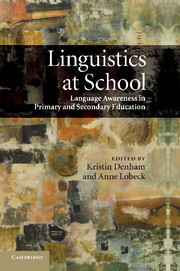Book contents
- Frontmatter
- Contents
- Notes on contributors
- Foreword: The challenge for education
- Introduction
- Part I Linguistics from the top down: encouraging institutional change
- Part II Linguistics from the bottom up: encouraging classroom change
- Introduction to Part II
- 9 From cold shoulder to funded welcome: lessons from the trenches of dialectally diverse classrooms
- 10 Positioning linguists as learners in K-12 schools
- 11 Fostering teacher change: effective professional development for sociolinguistic diversity
- 12 On promoting linguistics literacy: bringing language science to the English classroom
- 13 Linguistics in a primary school
- 14 Educating linguists: how partner teaching enriches linguistics
- 15 The Linguistic Olympiads: academic competitions in linguistics for secondary school students
- Part III Vignettes: voices from the classroom
- References
- Index
11 - Fostering teacher change: effective professional development for sociolinguistic diversity
Published online by Cambridge University Press: 04 August 2010
- Frontmatter
- Contents
- Notes on contributors
- Foreword: The challenge for education
- Introduction
- Part I Linguistics from the top down: encouraging institutional change
- Part II Linguistics from the bottom up: encouraging classroom change
- Introduction to Part II
- 9 From cold shoulder to funded welcome: lessons from the trenches of dialectally diverse classrooms
- 10 Positioning linguists as learners in K-12 schools
- 11 Fostering teacher change: effective professional development for sociolinguistic diversity
- 12 On promoting linguistics literacy: bringing language science to the English classroom
- 13 Linguistics in a primary school
- 14 Educating linguists: how partner teaching enriches linguistics
- 15 The Linguistic Olympiads: academic competitions in linguistics for secondary school students
- Part III Vignettes: voices from the classroom
- References
- Index
Summary
For nearly four decades, linguists concerned with educational inequity have argued that teacher change is a crucial element in the quest for educational justice around issues of language (Baugh 1999; Delpit 1995; Labov 1970; Le Page 1968; Seligman, Tucker, and Lambert 1972; Shuy 1969; Smitherman and Scott 1984; Winford 1976). Yet teacher education for sociolinguistic diversity remains an issue on which there is much discussion and some scattered efforts toward change, but little influence in the schools as a whole. By and large the field still does what it has always done to try to influence teacher attitudes and practices. Concerned linguists write journal articles, design and teach courses aimed at pre-service teachers, and offer the occasional in-service workshop for practicing educators. While such efforts undoubtedly prepare the soil of change, they have not yet borne the fruit we seek – the widespread adoption of linguistically sound teaching practices in K-12 classrooms. Nor have these efforts led to an adequate, research-based understanding of how and if negative language attitudes might be ameliorated. Effective models are sorely needed. In the absence of learning opportunities that expose them to research on language variation and its application to the classroom, teachers work with the same language ideologies at play in the wider society. Too often, this means that teachers believe that the language used in the African American community is a deficient, ‘broken’ form of English.
- Type
- Chapter
- Information
- Linguistics at SchoolLanguage Awareness in Primary and Secondary Education, pp. 161 - 174Publisher: Cambridge University PressPrint publication year: 2010
- 5
- Cited by



